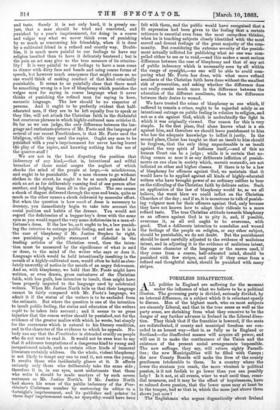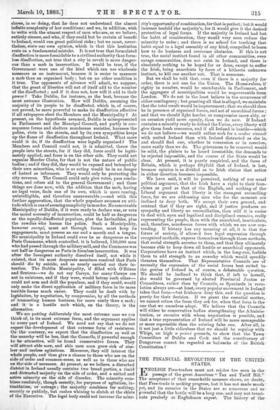FORMLESS DISAFFECTION.
ALL politics in England are suffering for the moment under the influence of what we believe to be a political illusion. The governing party is divided, seriously divided, by an internal difference, on a subject which it is reluctant openly to discuss. Men of the highest mark, who on most subjects are sincerely Liberal, and that in the true sense as well as the party sense, are shrinking from what they conceive to be the danger of any further advance in Ireland in the Liberal direc- tion. They think that if the franchise is lowered, if the seats are redistributed, if county and municipal freedom are con- ceded in an honest way—that is, as fully as in England or Scotland—the disaffected masses will acquire all power, and will use it to make the continuance of the Union and the existence of the present social arrangements impossible. The new suffrage, they say, will return eighty Parnell- ites ; the new Municipalities will be filled with Careys ; the new County Boards will make the lives of the county gentlemen intolerable to them. In a country where the lower the stratum you reach, the more virulent is political passion, is it not foolish to go lower than you can possibly help ? Is it not, at all events, wiser to wait until time, reme- dial measures, and it may be the effect of hopelessness, have so calmed down passion, that the lower mass may at least be in the temper, bad as that is, which the mass just above them shows just now ?
The Englishman who argues dogmatically about Ireland shows, in so doing, that he does not understand the almost infinite complexity of her conditions; and we, in addition, wish to write with the utmost respect of men who are, as we believe, entirely sincere, and who, if they could but be certain of benefit to Ireland, would run great political risks ; bat we must, never- theless, state our own opinion, which is that this hesitation rests on a fundamental mistake. It is not true that formulated disaffection is more formidable to a civilised authority than form- less disaffection, not true that a city in revolt is more danger- ous than a mob in insurrection. It would be true, if the Government were one of the kind which can use wholesale massacre as an instrument, because it is easier to massacre a mob than an organised body ; but on no other condition is it true. The opponents of advance will admit, we suppose, that the grant of liberties will not of itself add to the number of the disaffected ; and if it does not, how will it add to their power ? Take Dublin, for instance, as the best, because the most extreme illustration. How will Dublin, assuming the majority of its people to be disaffected, which is, of course, not proved, be more powerful to make its disaffection effective if all ratepayers elect the Members and the Municipality ? At present, on the hypothesis assumed, Dublin is misrepresented in Parliament and the Muncipal Council, and partly in con- sequence forms and shelters murderous societies, harasses the police, riots in the streets, and by its, own sympathies keeps up the flame of disaffection throughout Ireland. What more could it do, if its disaffection were legally organised ? The Members and Council could not, it is admitted, throw the people into the streets, for if they did, force could be legiti- mately applied, and force is on the other side. They could not organise Murder Clubs, for that is not the nature of public bodies ; and if they did, they would be exposed and betrayed by their own minorities, who in so acting would be in no danger of hatred as informers. They would only be protecting the city revenue. The Council could only give votes, pass resolu- tions, and refuse aid to the general Government ; and these things are done now, with the addition that the mob, having no legal voice, finds one of its own, which is mere roaring, unintelligible, and therefore unanswerable ;—and with this further aggravation, that the whole populace assumes an atti- tude which is one of seeming complicity in murder. No conceivable Municipality of Dublin, if it were ready to declare war, or vote the moral necessity of insurrection, could be half as dangerous as the equally-disaffected populace, plus the Invincibles, plus the rowdies who harass the police. Such a Municipality, however enrage, must act through forms, must keep its engagements, must possess an ear and a mouth and a tongue. No municipality in Ireland could ever be so dangerous as the Paris Commune, which controlled, it is believed, 150,000 men who had passed through the military mill, and the Commune was not half as dangerous as Paris in formless insurrection. It was after the Insurgent authority dissolved itself, not while it existed, that its most desperate members resolved that Paris should die by suicide, and so nearly carried out their in- tention. The Dublin Municipality, if filled with O'Briens and Sextons—we do not say Careys, for many Careys are not in existence, and if they were, would betray each other— could not arm and drill the populace, and if they could, would only make the direct application of military force in its more terrible forms much easier. They could be dealt with by legislation, by negotiation, by compromise, by all the methods of transacting human business, far more easily than a mob ; and it is a hostile mob which, on the theory, is the alternative.
We are putting deliberately the most extreme case we can think of, in its most extreme form, and the argument applies to every part of Ireland. We need not say that we do not expect the development of that extreme form of resistance. On the contrary, we expect that the disaffection as well as the anarchy will be less, that the Councils, if powerful enough to be attraetive, will be found conservative forces. They will attract able men, and able men soon grow sick of aim- less and useless agitations. Moreover, they will interest the whole people, and thus give a chance to those who are on the side of order and common-sense, as well as to those who are on the side of unreason. At present, as we believe, a disturbed district in Ireland usually contains two broad parties, a timid and distracted majority on the side of order, and a united and active minority on the side of disorder. The minority com- bines resolutely, though secretly, for purposes of agitation, in- timidation, or outrage ; the majority combines for nothing, secretly or publicly, but rushes whining to clutch at the skirts of the Executive. The legal body could not increase the mino-
rity's opportunity of combination, for that is perfect; but it would increase tenfold the majority's, for it would give it the desired protection of legal forms. If the majority in Ireland had but the habit of combination, they would very soon reduce the minority to order ; and there is no school for teaching that habit equal to a legal assembly of any kind, compelled to learn how to do business and overcome obstacles. If this is not true, the social instinct found in all other communities, even savage communities, does not exist in Ireland, and there is absolutely nothing to be hoped for or done, except to suffer the Irish, being anarchists by force of a hitherto unknown instinct, to kill one another out. That is nonsense.
But we shall be told that, even if there is a majority for order, there is not one for the Union. The Home-rulers, if eighty in number, would be unendurable in Parliament, and the aggregate of municipalities would be ungovernable from London. We do not in the least believe in the occurrence 'of either contingency; but granting all that is alleged, we maintain, that the total result. would be improvement ; that we should then be in presence of organised forces, and not of anarchical forces ; and that we should fight harder, or compromise more ably, or on occasion yield more openly, than we do now. If Ireland contains a minority ready to defend the Union, every liberty will give them fresh resources, and if all Ireland is hostile—which we do not believe—we would rather seek for a modus viventli with united Ireland than with Ireland distracted as she is, and should find one, whether in concession or in coercion, more easily than we do. The grievances to be removed would be solid, the plaints to be heard irresistible, the demands to be rejected impossible, and the coarse of the State would be clear. At present, it is purely empirical, and the force of Britain, which is perhaps fiftyfold that of Ireland, is lost,. because opinion is so divided as to Irish claims that action in either direction becomes impossible.
We have said, it will be perceived, nothing of our usual political argument, that the Irish have a right to their fran- chises as good as that of the English, and nothing of the• Liberal argument that liberty is the strongest reconciling force, for we are addressing men who for the moment are inclined to deny both. We accept their own ground, and contend that if they are right, and if justice produces no sympathy and liberty no reconciliation, then still it is easier to deal with open and legalised and disciplined enemies, really representing the people, than with the anarchical, inarticulate, and, therefore, murderous forces with which we are now con- tending. If history has any meaning at all, it is that the- forces of society, if allowed free legal expression through recognised methods, express themselves through those methods, that social strength accretes to them, and that they ultimately become able to keep down all hostile or anarchical opponents. Corporations have an instinct which, in the long-run, forbids them to add strength to an anarchy which would speedily threaten themselves. That Representative Councils are of necessity the expression of the social forces best suited to- the genius of Ireland is, of course, a debateable question_ We should be inclined to think that, if left to herself, she would be governed by elected Provincial Juntas or Committees, rather than by Councils, as Spaniards in revo- lution always are—at least, every popular movement in Ireland takes that form—but Irishmen deny this, and the question is purely for their decision. If we grant the essential matter, we cannot refuse the form they ask for, when that form is the one that we ourselves adopt. We believe that the Councils will either be conservative bodies strengthening the Alminis- tration, or enemies with whom negotiation is possible, and that a true representation of Ireland will be more manageable or more repressible than the existing false one. After all, is it not just a little ridiculous that we should be arguing with Whigs, on high a priori grounds, to show that the Town Councillors of Dublin and Cork and the constituency of Dungarvan cannot be regarded as bul marks of the British, Constitution ?



































 Previous page
Previous page